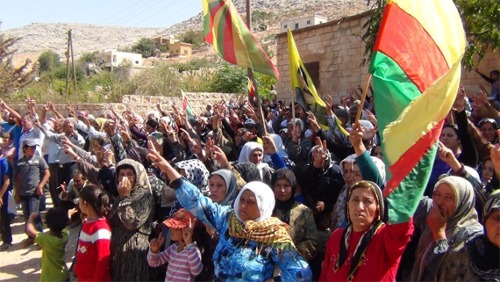In December, a delegation of European academics and others, including some social ecologists, participated in a week-long visit to the Kurdish region of Syria – known as Rojava – to witness the experiments in “democratic confederalism” that are underway. Janet Biehl has posted the first report on the delegation at ROARmag.org, one of the best websites chronicling various political uprisings around the world. Also ZNet has posted an interview with David Graeber, who also participated in the delegation, focusing on the Kurdish movement’s implications for our understanding of revolutionary possibilities in our time.
Here’s an excerpt from Janet’s article. Full story is at roarmag.org/2014/12/janet-biehl-report-rojava:
Under their Third Way, Rojava’s three cantons declared Democratic Autonomy and formally established it in a “social contract” (the non-statist term it uses instead of “constitution”). Under that program, they created a system of popular self-government, based in neighborhood commune assemblies (comprising several hundred households each), which anyone may attend, and with power rising from the bottom up through elected deputies to the city and cantonal levels.
When our delegation visited a Qamishlo neighborhood (Qamishlo being the largest city in the Cezire canton), we attended a meeting of a local people’s council, where the electricity and matters relating to women, conflict resolution and families of martyrs were discussed. Men and women sat and participated together. Elsewhere in Qamishlo, we witnessed an assembly of women addressing problems particular to their gender.
Gender is of special importance to this project in human emancipation. We quickly realized that the Rojava Revolution is fundamentally a women’s revolution. This part of the world is traditionally home to extreme patriarchal oppression: to be born female is to be at risk for violent abuse, childhood marriage, honor killings, polygamy, and more.
But today the women of Rojava have shaken off that tradition and participate fully in public life: at every level of politics and society. Institutional leadership consists not of one position but two, one male and one female official — for the sake of gender equality and also to keep power from concentrating into one person’s hands
A few weeks later, a report from the delegation as a whole, along with an appeal for support, was posted on ROARMag.org and on ZNet. Here’s an excerpt from that document:
In Rojava, we believe, genuinely democratic structures have indeed been established. Not only is the system of government accountable to the people, but it springs out of new structures that make direct democracy possible: popular assemblies and democratic councils. Women participate on an equal footing with men at every level and also organize in autonomous councils, assemblies, and committees to address their specific concerns. The women we met embodied the empowerment, self-confidence, and pride recently gained by the women of Rojava. We saw banners and slogans that read: “The Rojavan revolution is a women’s revolution.” It really is.
… Wherever we went, members of the self-government and the armed forces insisted that any viable political alternatives for the region had to be based not on revenge but on shared interests and mutual trust. We met members of the Asayis, the internal security units, as well as of YPG, and YPJ, who were Kurds, Chechens, Syriacs, and Arab, all of whom emphasized that they seek common solutions for all peoples of the region. They face daunting challenges, but we are convinced that their aspirations are sincere.
As scholars and activists, we all left with a deep respect and admiration for the people of Rojava, for their progressive political program and actual social accomplishments. They have found in democratic self-government a practical way of solving their own problems. Still, Rojava suffers from pressing conditions that are outside of the control of its citizens. Therefore, we close by recommending that they be addressed as soon as possible:
This was followed by a series of three specific recommendations. See https://zcomm.org/znetarticle/joint-statement-of-the-academic-delegation-to-rojava.


